Description
Editor: Adam Jones
ISBN: 978-0-9782526-9-4
Dimension: 6 x 9″
Number of Pages: 313
Synopsis: Evoking Genocide: Scholars and Activists Describe the Works that Shaped their Lives compiles sixty short essays, all but two of them original to this book, written by leading scholars and activists in the field of genocide studies. These authors pay eloquent tribute to the works of art and media that influenced their engagement with genocide and crimes against humanity. The subjects include books and stories, films, songs, drawings, documents, monuments, sculptures, personal testimonies, and even a Lego set.
In an accessible and often deeply personal way, contributors explore their own relationships with the works in question. Edited by Adam Jones, recently selected one of “Fifty Key Thinkers” in Holocaust and genocide studies, Evoking Genocide makes an important contribution to the study of the art and culture of mass atrocity.
Accompanying this edited volume is a website, www.evokinggenocide.org, which serves both to publicize the book and as a forum for readers and others to offer their thoughts on works that have influenced them personally. Readers are invited to visit the website and consider contributing their own essay, a number of which would be incorporated in any future editions of the book.
About the Contributors |
| Atenea Acevedo was born and lives in the world that is Mexico City. She holds a bachelor’s degree in International Relations with a specialization in Central European studies, a diploma in English-Spanish interpretation and translation, and a diploma in gender and equity relations between women and men. In translation and interpretation, she has found the ideal tools to structure her activism for human rights, gender equality and social change. |
| Diane F. Afoumado is Lead Researcher at the Survivors Registry of the U.S. Holocaust Memorial Museum in Washington, DC. Her publications include L’affiche antisémite en France sous l’Occupation (Berg International, 2008), and Exil Impossible. L’errance des Juifs du paquebot St. Louis (L’Harmattan, 2005). She contributed to Repicturing the Second World War: Representations in Film and Television (Palgrave Macmillan, 2007), and was co-author with Serge Klarsfeld of La Spoliation dans les camps de province. La documentation française(2000). She has also published more than twenty articles. |
| Joyce Apsel teaches in the Liberal Studies Program at New York University and is the 2008–2009 recipient of the NYU Distinguished Teaching Award. She is editor of Darfur: Genocide Before our Eyes (Institute for the Study of Genocide, 3rd edn., 2007) and Teaching about Human Rights (American Sociological Association, 2005). She is president of the Institute for the Study of Genocide and director of the education project, RightsWorks International. |
| Paul R. Bartrop is an Honorary Fellow in the Faculty of Arts and Education at Deakin University, Melbourne, Australia, and Head of History at Bialik College, Melbourne, teaching subjects in history, international studies, and comparative genocide studies. He has previously been a Scholar-in-Residence at the Martin-Springer Institute for Teaching the Holocaust, Tolerance and Humanitarian Values at Northern Arizona University, and a Visiting Professor at Virginia Commonwealth University. A past president of the Australian Association of Jewish Studies, Dr. Bartrop has published nine books and numerous scholarly articles, mostly in the areas of Holocaust and genocide studies, and has served on the editorial committees of a number of Australian and international periodicals. |
| Helen Bond is Assistant Professor in the Department of Curriculum and Instruction at Howard University in Washington DC. She is author of “Teaching the Holocaust in the urban classroom,” in T. Duboys, ed., Pathways to the Holocaust (Sense Publishers, 2008). She also serves as a Human Rights Commissioner appointed by the governor of West Virginia. With a Ph.D in Human Development, her research interests are human rights, teacher education, and development and genocide. |
| R. Charli Carpenter is Assistant Professor of Political Science at the University of Massachusetts-Amherst. Her teaching and research interests include national security ethics, transnational advocacy networks, gender and political violence, and comparative genocide studies. She is the author of “Innocent Women and Children”: Gender, Norms and the Protection of Civilians (Ashgate, 2006), and the editor of Born of War: Protecting Children of Sexual Violence Survivors in Conflict Zones (Kumarian Press, 2007). She has also published numerous articles in journals such as International Organization, International Studies Quarterly, International Feminist Journal of Politics, Security Dialogue and Human Rights Quarterly, and has served as a consultant for the United Nations. |
| Ward Churchill is the author of more than 20 books, including A Little Matter of Genocide: Holocaust and Denial in the Americas, 1492 to the Present (City Lights, 1997), On the Justice of Roosting Chickens: Reflections on the Consequences of U.S. Imperial Arrogance and Criminality (AK Press, 2003), and Kill the Indian, Save the Man: The Genocidal Impact of American Indian Residential Schools (City Lights, 2004). Most recently, a jury concluded that he had been illegally fired from his faculty position at the University of Colorado for expressing his political views. It is expected that he will be reinstated as a tenured full professor of American Indian Studies, effective fall semester 2009. |
| Sara Cohan serves as Education Director of the Genocide Education Project, a non-profit educational organization that assists educators in teaching about human rights and genocide, particularly the Armenian Genocide. Cohan’s background combines research, study, curriculum development and teaching. She was a high school teacher for five years before serving as a research fellow for Teaching Tolerance, a project of the Southern Poverty Law Center. She also studied in Mexico as a recipient of a Fulbright-Hays scholarship. She has written articles and designed educational materials for a variety of organizations. |
| G. Jan Colijn is Dean of General Studies and Professor of Political Science at The Richard Stockton College of New Jersey. He is co-author, with his late father, of Ruin’s Wheel: A Father on War, A Son on Genocide (ComteQ, 2006), and author or editor of several other books. His work in Holocaust and genocide education has garnered several awards. |
| John M. Cox is Assistant Professor of History at Florida Gulf Coast University, where he directs the Center for Judaic, Holocaust, and Human Rights Studies. He is the author of Circles of Resistance: Jewish, Leftist, and Youth Dissidence in Nazi Germany (Peter Lang, 2009), and is preparing a book on genocide in the twentieth century. Dr. Cox is also on the editorial board of the Journal of Jewish Studies. |
| Marcia Esparza is an Assistant Professor in the Criminal Justice department at John Jay College of Criminal Justice. Since 1997, she has undertaken research on state violence and genocide in Guatemala and Chile. She is the co-editor of State Violence and Genocide in Latin America: The Cold War Years (Routledge, 2009). She is also Director of the Historical Memory Project, a resource center documenting the history of violence in the western hemisphere. |
| Stephen C. Feinstein (1943–2008) was Adjunct Professor of History at the University of Minnesota and Director of the Center for Holocaust and Genocide Studies. Among his published edited volumes are Confronting the Holocaust (University Press of America, 1998) and Absence/Presence: Critical Essays on the Artistic Memory of the Holocaust (Syracuse University Press, 2005). Please see the Preface for further information about Dr. Feinstein. |
| Jonathan C. Friedman is the Director of Holocaust and Genocide Studies and Associate Professor of History at West Chester University. He is the author of five books, most recently Performing Difference: Representations of the ‘Other’ in Film and Theatre (Rowman and Littlefield, 2008), and Rainbow Jews: Gay and Jewish Identity in the Performing Arts (Rowman and Littlefield, 2007). |
| Donna-Lee Frieze is a Research Fellow at the School of History, Heritage and Society, Deakin University, Melbourne. She is collaborating with a team of historians and museologists on a history of the Melbourne Jewish Holocaust Centre. Her teaching and research areas include genocide studies, film, and philosophy. |
| Lee Ann Fujii is Assistant Professor of Political Science and Program Coordinator of the politics cohort of the Women’s Leadership Program at the George Washington University. She is the author of Killing Neighbors: Webs of Violence in Rwanda (Cornell University Press, 2009). She has also authored articles on mass killing, ethnicity, and fieldwork challenges in postwar settings. |
| Alexander George is Professor of Philosophy at Amherst College in Amherst, Massachusetts. He is the author of Philosophies of Mathematics (with Daniel J. Velleman) (Wiley-Blackwell, 2001), and a collection of Humor, Sense and Nonsensibility (Fireside, 2004). He has also edited What Would Socrates Say? (Random House, 2007), a collection of questions and answers drawn from AskPhilosophers.org, a Web site where philosophers answer questions sub¬mitted by the public. He occasionally suffers from chess fever, and maintains the Web forum ChessProblem.net. |
| Simone Gigliotti is a Senior Lecturer in the History Programme at Victoria University, Wellington, New Zealand. She is the co-editor of The Holocaust: A Reader (Blackwell Publishing, 2005), and the author of The Train Journey: Transit, Captivity and Witnessing in the Holocaust (Berghahn Books, 2009). |
| Eric Gordy is Senior Lecturer in the Department of Social Sciences at the School of Slavonic and East European Studies of University College London, where he is director of the Centre for Southeast European Studies. His research involves culture and politics during and in the wake of the wars of Yugoslav succession; he is the author of The Culture of Power in Serbia: Nationalism and the Destruction of Alternatives (Penn State Press, 1999). |
| Fred Grünfeld is Associate Professor of International Relations and International Organizations at the Faculty of Law of Maastricht University, the Netherlands. At Maastricht University he researches and teaches at the Maastricht Centre for Human Rights and the University College Maastricht. He is also Professor in the Causes of Gross Human Rights Violations at the Centre for Conflict Studies, Faculty of Humanities at Utrecht University. His research is on comparative genocide studies (Rwanda, Srebrenica and Darfur), in particular the failures of third parties to prevent genocide. |
| Wendy C. Hamblet is a Canadian philosopher, and Associate Professor of Liberal Studies at North Carolina A&T State University. She has authored three books on radical violence, including The Sacred Monstrous: A Reflection on Violence in Human Communities (Rowman and Littlefield, 2004) and Savage Constructions: The Myth of African Savagery (Rowman and Littlefield, 2008), several anthologies, and many articles in peer-refereed international journals. Hamblet is also a practicing Philosophical Counselor and Mediator in public and private sectors. |
| Michael Hayse is Director of the Master of Arts Program in Holocaust and Genocide Studies and Associate Professor of Historical Studies at the Richard Stockton College of New Jersey. He is author of Recasting West German Elites: Higher Civil Servants, Business Leaders, andPhysicians in Hesse between Nazism and Democracy, 1945–1955 (Berghahn Books, 2003). |
| Viktoria Hertling founded the Center for Holocaust, Genocide & Peace Studies at the University of Nevada, Reno, in 1994, and served as its director until her retirement in 2008. She currently lives in Berlin, Germany. |
| William L. Hewitt is Professor of History and co-founder of the West Chester University of Pennsylvania Holocaust/Genocide Studies Program. He is the editor of Defining the Horrific: Readings on Genocide and Holocaust in the Twentieth Century (Prentice-Hall, 2003). |
| Winton Higgins is a Visiting Research Fellow in Cultural Studies at the University of Technology, Sydney. A graduate of the universities of Sydney, Stockholm, and London, he has been a board member of the Australian Institute for Holocaust and Genocide Studies for the last ten years, and is the author of the Holocaust-themed travel diary, Journey into Darkness (Brandl & Schlesinger, 2003). He has also contributed articles to the research series, Genocide Perspectives. |
| Alex Hinton is Director of the Center for the Study of Genocide and Human Rights (CGHR) and Associate Professor of Anthropology and Global Affairs at Rutgers University, Newark (http://cghr.newark.rutgers.edu/). He is the author of Why Did They Kill? Cambodia in the Shadow of Genocide (University of California Press, 2005), which received the 2008 Stirling Prize, and five edited or co-edited collections, including most recently Genocide: Truth, Memory, and Representation (Duke University Press, 2009). |
| Steven L. Jacobs holds the Aaron Aronov Endowed Chair of Judaic Studies at the University of Alabama, where he is an Associate Professor of Religious Studies. He is the author, editor, or translator of more than sixteeen books, including his latest, Confronting Genocide: Judaism, Christianity, Islam (Lexington Books, 2009). His primary fields of research are biblical interpretation, both Hebrew Bible and New Testament, and the Holocaust and historical and contemporary genocides. He remains active on the executive of the International Association of Genocide Scholars. |
| Adam Jones see The Editor |
| Ani Kalayjian holds an honorary Doctor of Science degree from Long Island University (2001), recognizing her 20 years as a pioneering clinical researcher, professor, and administrator at the United Nations. In 2007, she was awarded Columbia University Teacher College’s Distinguished Alumni of the Year. She is the author of Disaster and Mass Trauma (Vista Publishing, 1995), coeditor of the volume Forgiveness and Reconciliation (Springer, 2009), and author of over 40 articles on clinical methods, human rights, trauma, and women’s issues. |
| Nina Krieger is Education Director at the Vancouver Holocaust Education Centre. She studied History at the University of British Columbia and Humanities & Cultural Studies at the London Consortium, a multi-disciplinary graduate program of the University of London, the Architectural Association, the Institute of Contemporary Arts, and the Tate Gallery. She has developed exhibitions, public programs, and education programs at contemporary art galleries and historical museums in the United Kingdom and Canada. |
| Scott Laderman is an Assistant Professor of History at the University of Minnesota, Duluth. He is author of Tours of Vietnam: War, Travel Guides, and Memory (Duke University Press, 2009). |
| Raphael Lemkin (1900–59) was the pioneer of genocide studies. Born in Poland, he worked as a lawyer in the 1930s on concepts of “barbarity” and “vandalism” to describe, and outlaw, the destruction of ethnic and religious minorities. Fleeing the Nazi invasion of Poland in 1939, he took refuge in the United States, where in 1944 he published Axis Rule in Occupied Europe (Carnegie Endowment for International Peace, republished by Lawbook Exchange in 2005). In this work, Lemkin coined the term “genocide,” and explored its strategies and consequences in the lands under Nazi occupation. Lemkin spent the immediate postwar years in a relentless campaign to persuade the United Nations to adopt the Convention on the Prevention and Punishment of the Crime of Genocide, which it did in 1948. In 1951, the convention attracted a sufficient number of ratifications to become international law. The final years of Lemkin’s life were spent in penury and obscurity, but the modern field of comparative genocide studies has built upon his foundational contribution. His wealth of previously-unpublished writings continue to appear, influencing new generations of scholars and students. |
| Benjamin Lieberman is Professor of History at Fitchburg State College in Massachusetts. He is the author of Terrible Fate: Ethnic Cleansing in the Making of Modern Europe (Ivan R. Dee, 2006). His research focuses on ethnic cleansing and the remaking of border zones. |
| Fiona de Londras is a member of faculty at the School of Law, University College Dublin, where she is also a member of the Institute of Criminology. She publishes widely on international law and resistance to repressive state action, with a particular focus on counter-terrorism and the judicial role. Her research has appeared in, among other journals, Modern Law Review, American Journal of International Law and Israel Law Review. |
| Pam Maclean is a Senior Lecturer in History at Deakin University in Victoria, Australia, where she teaches courses in Holocaust and genocide. With Michele Langfield and Dvir Abramovich she has edited and contributed to Testifying to the Holocaust (AAJS, 2008), the first systematic study of video testimonies given by survivors to the Jewish Holocaust Centre, Melbourne. She is currently co-ordinating the writing of a history of the Jewish Holocaust Centre in Melbourne. |
| Daniel H. Magilow is Assistant Professor of German at the University of Tennessee in Knoxville, Tennessee. He is the editor and translator of In Her Father’s Eyes: A Childhood Extinguished by the Holocaust (Rutgers University Press, 2008) and the author of numerous articles about the Holocaust, its memorialization, and its representation in visual culture. |
| Henry Maitles is Reader in Education at the University of Strathclyde in Glasgow, Scotland. He was a member of the Scottish Review Group on Education for Citizenship which drew up the proposals now in place in every Scottish school. He teaches about and researches the impact of subjects such as the Holocaust on school students’ values and attitudes. He has published sole-authored and edited books, as well as articles in refereed journals and the wider media. |
| Jens Meierhenrich is Assistant Professor of Government and of Social Studies at Harvard University. He is the author of a genocide trilogy, comprising The Rationality of Genocide, The Structure of Genocide, and The Culture of Genocide (all forthcoming from Princeton University Press). He is also preparing, for Oxford University Press, Genocide: A Reader and Genocide: A Very Short Introduction. He recently published The Legacies of Law (Cambridge University Press, 2008). |
| Jina Moore is an independent reporter and producer who has covered human rights issues in Sierra Leone, Rwanda, the Democratic Republic of Congo, and the US. A regular correspondent for the Christian Science Monitor, her work has also appeared in The Boston Globe, Glamour Magazine and Best American Science Writing. Her archive and blog may be found at www.jinamoore.com. |
| Thomas Nagy was a tenured Associate Professor of Expert Systems in Washington, DC. He researches the application of Web 2.0 methods and linguistics to aid doubly exceptional students (both gifted and chal¬lenging), and making progressive Web applications more persuasive and easier to use. He is deeply concerned with issues of structural violence, and invites correspondence from those interested in this subject. |
| Edward Paulino teaches a wide range of writing-intensive interdisciplinary courses at the John Jay College of Criminal Justice at the City University of New York. His research interests include race, genocide, borders, nation-building, Latin America and the Caribbean, the African diaspora, and New York State history. His research has been supported by the Fulbright Foundation, the National Endowment for the Humanities, the PSC-CUNY Research Foundation, and the New York State Archives. He lives in Brooklyn with his wife and daughter. |
| Christopher Powell is Assistant Professor of Sociology at the University of Manitoba in Winnipeg, Canada. He is the author of “What Do Genocides Kill? A Relational Conception of Genocide,” published in the Journal of Genocide Research in 2007. His current book project, Civilization and Genocide, theorizes the relationship between the expansion of western civilization, the conversion of difference into danger, and the practice of genocide. |
| Jack Nusan Porter is the author or editor of such works as The Jew as Outsider (University Press of America, 1981), Genocide and Human Rights (University Press of America, 1982), Sexual Politics in Nazi Germany (Spencer Press, 1995), and The Genocidal Mind (University Press of America, 2006). Born in Ukraine in 1944, he is a child Shoah survivor of two Soviet partisans, and was subsequently educated in Jerusalem, at the University of Wisconsin, Milwaukee, and at Northwestern University. Wikipedia page: http://en.wikipedia.org/wiki/Jack_Porter. |
| Eric Reeves is Professor of English Language and Literature at Smith College in Northampton, Massachusetts. He has spent the past ten years working full-time as a Sudan researcher and analyst, publishing extensively both in the US and internationally. He has testified several times before Congress, has lectured widely in academic settings, and has served as a consultant to a number of human rights and humanitarian organizations operating in Sudan. He is author of A Long Day’s Dying: Critical Moments in the Darfur Genocide (The Key, 2007). |
| Stefanie Rixecker is Dean of the Faculty of Environment, Society & Design at Lincoln University in New Zealand. She is Leader of the “Global Justice and Environmental Policy” theme at the Land, Environment and People (LEaP) Research Centre. She is also a member of the advisory board for Local Environment: The International Journal of Justice and Sustainability and is Chair of the Governance Board of Amnesty International, Aotearoa, New Zealand. |
| John K. Roth is the Edward J. Sexton Professor Emeritus of Philosophy and the Founding Director of the Center for the Study of the Holocaust, Genocide, and Human Rights at Claremont McKenna College. He has published hundreds of articles and reviews, and authored, co-authored, or edited more than forty books, including Genocide and Human Rights: A Philosophical Guide (Palgrave Macmillan, 2005); Ethics During and After the Holocaust: In the Shadow of Birkenau (Palgrave Macmillan, 2005); and Anguished Hope: Holocaust Scholars Confront the Palestinian-Israeli Conflict (Wm. B. Eerdmans, 2008). |
| Victoria Sanford is Associate Professor of Anthropology at Lehman College and the Graduate Center, City University of New York. She serves as a Research Associate at Columbia University’s Center for International Conflict Resolu¬tion and an Affiliated Scholar at Rutgers University’s Center for the Study of Genocide and Human Rights. She is the author of four books on Guatemala, including Buried Secrets: Truth and Human Rights in Guatemala(Palgrave Macmillan, 2003). As a John Simon Guggenheim Fellow (2009–2010), she is writing The Land of Pale Hands: Feminicide, Social Cleansing and Impunity in Guatemala. |
| William Schabas is Director of the Irish Centre for Human Rights, National University of Ireland, Galway, where he is Professor of Human Rights Law. He is the author of Genocide in International Law: The Crime of Crimes (Cambridge University Press, 2nd edition, 2009), and many journal articles on legal aspects of genocide. Professor Schabas was a member of the Sierra Leone Truth and Reconciliation Commission. He is an Officer of the Order of Canada and Member of the Royal Irish Academy. |
| Dominik J. Schaller is Lecturer and Researcher at the Ruprecht-Karls-University, Heidelberg, Germany. He is editor of the Journal of Genocide Research and Executive Secretary of the International Network of Genocide Scholars (INoGS). His main areas of research are the history of mass violence, colonialism, and modern African history. Schaller is the editor of numerous volumes and articles on German colonial rule in Africa, as well as the Armenian and Rwandan genocides. |
| Russell Schimmer is currently a dual-degree J.D.-Ph.D. candidate at the University of Connecticut. His Ph.D. research is on multi-temporal spaceborne remote sensing of environmental change and its applications to monitoring anthropogenic activities, especially the large-scale violence characteristic of genocide. His legal interests are primarily in developing approaches to spaceborne remote sensing obtention and admissibility. He also researches processes of largescale mineral extraction, primarily global copper and gold mining. |
| Jacques Sémelin is Professor of Political Science (Sciences Po Paris, Center for International Research and Studies). He is author of Purify and Destroy: The Political Uses of Massacre and Genocide (Columbia University Press, 2007), and founder and editor-in-chief of the online Encyclopedia of Mass Violence (Sciences Po, 2008), www.massviolence.org. His text in this volume is excerpted from his autobiography, J’arrive où je suis étranger, recently published in French by Le Seuil. |
| David J. Simon is a Lecturer in the Department of Political Science at Yale University. His research addresses development assistance, post-conflict recovery, and reconciliation, focusing in part on Rwanda. For the past five years, he has taught a seminar entitled “The Rwandan Genocide in Comparative Perspective.” |
| Robert Skloot retired from forty years of teaching, administrating and stage directing at the University of Wisconsin-Madison in 2008. He is the author and editor of many books and essays about the theater of the Holocaust and genocide, including the two-volume The Theatre of the Holocaust (University of Wisconsin Press, 1982, 1999). His one-act play, If the Whole Body Dies: Raphael Lemkin and the Treaty against Genocide (Parallel Press, 2006), has been read around the world. |
| Christopher C. Taylor is Professor of Anthropology at the University of Alabama at Birmingham. He is the author of Sacrifice as Terror: The Rwandan Genocide of 1994 (Berg, 1999). He has also written extensively about traditional medicine in Rwanda, ethnicity, the state, and Rwanda’s pre-genocidal media. |
| Ernesto Verdeja is Assistant Professor of Political Science and Peace Studies at the University of Notre Dame. His research interests are comparative genocide and theories of justice, forgiveness, and reconciliation. He is the author of the forthcoming Unchopping A Tree: Reconciliation in the Aftermath of Political Violence (Temple University Press, 2009). |
| Joseph Robert White is research assistant at the Center for Advanced Holocaust Studies, and Adjunct Associate Professor at the University of Maryland University College. He holds a doctorate in Modern European history from the University of Nebraska-Lincoln, and is editor of The Camps and Ghettos of Germany’s Allies, Satellites, and Collaborationist States, Volume 4 of The United States Holocaust Memorial Museum Encyclopedia of Camps and Ghettos (Indiana University Press/USHMM). His articles have appeared in Holocaust and Genocide Studies, Journal of Jewish Identities, and Today’s Best Military Writing. |
| Benjamin Whitmer lives and works in Denver, Colorado with his wife and children. His first novel, Pike, is forthcoming from PM Press. |
| John C. Zimmerman is an Associate Professor in the College of Business at the University of Nevada Las Vegas. He is author of the book Holocaust Denial: Demographics, Testimonies and Ideologies (University Press of America, 2000). He has published articles on Pearl Harbor revisionism, the Auschwitz death camp, and radical Islam. |
| Lior Zylberman is currently studying for his Masters in Communication and Culture at the University of Buenos Aires. He is Associate Professor of Design of Image and Sound at the University of Buenos Aires, and a researcher on genocide, imagery, and society. He has written several works on memory and cinema. |

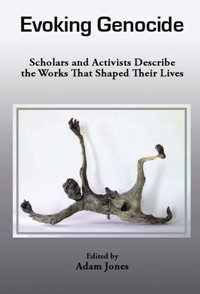
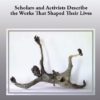
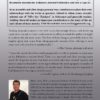
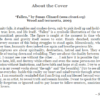
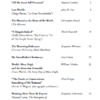
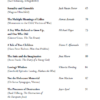
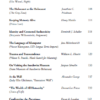
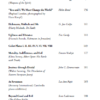
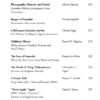
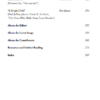
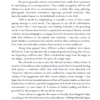
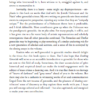
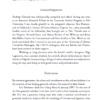
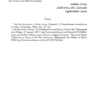
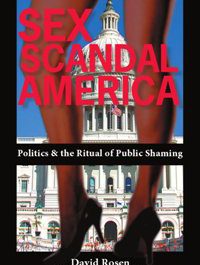
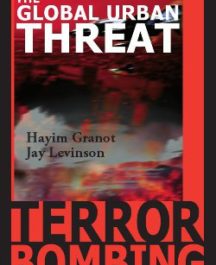
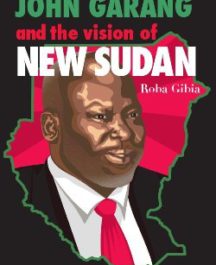
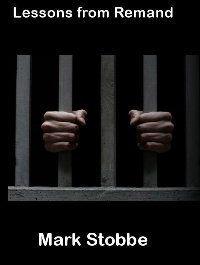
Mia Farrow –
“Evoking Genocide comprises sixty brief essays, fascinatingly diverse, each deploying a particular textual or visual touchstone in an effort to reveal the author’s struggle to confront the ultimate crime. The best of them bring us powerfully close to the singular agony that comes from taking genocide seriously, from refusing to turn away from evil even if it is unfathomable.”
-Mia Farrow, advocate and actor
Gerald Caplan –
“Those who spend their lives studying genocide in order to prevent its recurrence are by definition a curious breed. These very personal and often moving essays reveal the disparate sources that have motivated otherwise ‘normal’ women and men to immerse themselves in trying to fathom the most egregious examples of man’s inhumanity to man (and yes, it’s mostly men). Readers may be surprised to find themselves wanting to join the cause.”
-Gerald Caplan, author of The Betrayal of Africa